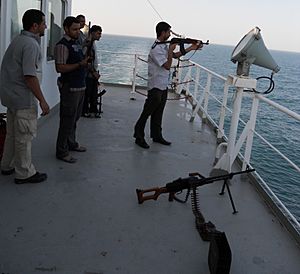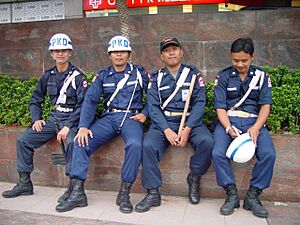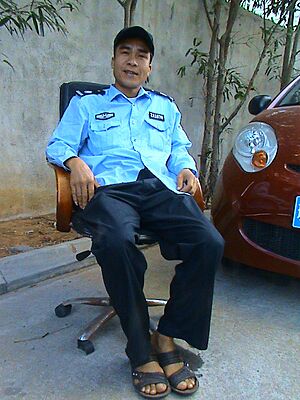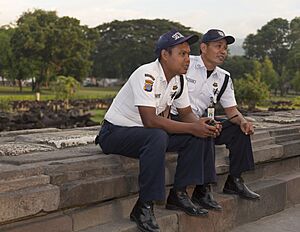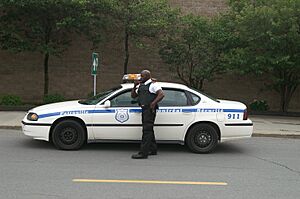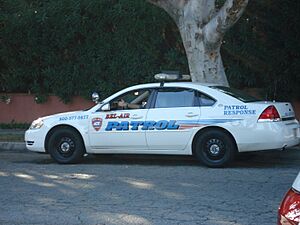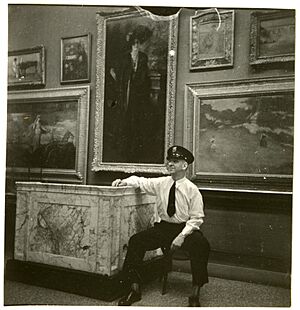Security guard facts for kids
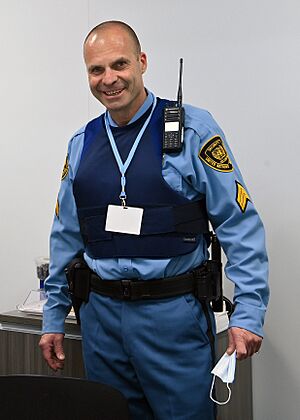
|
|
| Occupation | |
|---|---|
|
Occupation type
|
Employment |
|
Activity sectors
|
Security |
| Description | |
|
Related jobs
|
Usher, bouncer, doorman, bodyguard, hall monitor, armored car guard, loss prevention officer |
A security guard (also known as a security inspector, security officer, factory guard, or protective agent) is a person employed by a government or private party to protect the employing party's assets (property, people, equipment, money, etc.) from a variety of hazards (such as crime, waste, damages, unsafe worker behavior, etc.) by enforcing preventative measures. Security guards do this by maintaining a high-visibility presence to deter illegal and inappropriate actions, looking (either directly through patrols, or indirectly by monitoring alarm systems or video surveillance cameras) for signs of crime or other hazards (such as a fire), taking action to minimize damage (such as warning and escorting trespassers off property), and reporting any incidents to their clients and emergency services (such as the police or emergency medical services), as appropriate.
Security officers are generally uniformed to represent their lawful authority to protect private property. Security guards are generally governed by legal regulations, which set out the requirements for eligibility (such as a criminal record check) and the permitted authorities of a security guard in a given jurisdiction. The authorities permitted to security guards vary by country and subnational jurisdiction. Security officers are hired by a range of organizations, including businesses, government departments and agencies and not-for-profit organizations (e.g., churches and charitable organizations).
Until the 1980s, the term watchman was more commonly applied to this function, a usage dating back to at least the Middle Ages. This term was carried over to North America where it was interchangeable with night watchman until both terms were replaced with the modern security-based titles. Security officers are sometimes regarded as fulfilling a private policing function.
Contents
Functions and duties
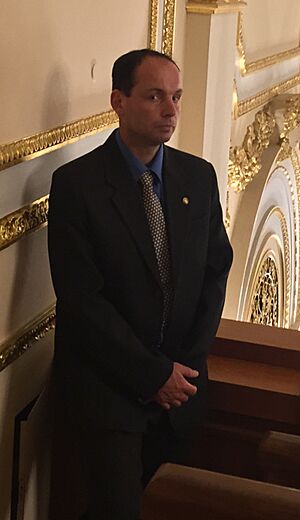
Many security firms and proprietary security departments practice the "detect, deter, observe and report" method. Security officers are not required to make arrests, but have the authority to make a citizen's arrest, or otherwise act as an agent of law enforcement, for example, at the request of a police officer or a sheriff.
A private security officer's responsibility is protecting their client from a variety of hazards (usually in the form of criminal acts). Security personnel enforce company rules and can act to protect lives and property, and they sometimes have a contractual obligation to provide these actions. In addition to basic deterrence, security officers are often trained to perform specialized tasks such as arrest and control (including handcuffing and restraints), operate emergency equipment, perform first aid, CPR, take accurate notes, write detailed reports, and perform other tasks as required by the client they are serving. All security officers are also required to go through additional training mandated by the state for the carrying of weapons such as batons, firearms, and pepper spray (e.g. the Bureau of Security and Investigative Services in California has requirements that a license for each item listed must be carried while on duty). Some officers are required to complete police certification for special duties. In recent years, due to elevated threats of terrorism, most security officers are required to have bomb-threat training and/or emergency crisis training, especially those located in soft target areas such as shopping malls, schools, and any other area where the general public congregate. One major economic justification for security personnel is that insurance companies (particularly fire insurance carriers) will give substantial rate discounts to sites which have a 24-hour presence. For a high risk or high-value property, the discount can often exceed the money being spent on its security program. Discounts are offered because having security on site increases the odds that any fire will be noticed and reported to the local fire department before a total loss occurs. Also, the presence of security officers (particularly in combination with effective security procedures) tends to diminish "shrinkage", theft, employee misconduct, and safety rule violations, property damage, or even sabotage. Many casinos hire security officers to protect money when transferring it from the casino to the casino's bank.
Security personnel may also perform access control at building entrances and vehicle gates; meaning, they ensure that employees and visitors display proper passes or identification before entering the facility. Security officers are called upon to respond to potential hazards (such as broken lights or doors, disturbances, lost persons, minor injuries, etc.) and to assist in serious emergencies (medicals, fires, crime, etc.) by securing the scene to prevent further loss or damage, summoning emergency responders to the incident, helping to redirect foot traffic to safe locations, and by documenting what happened on an incident report to give their client an idea of how to prevent similar situations from occurring. Armed security officers are frequently contracted to respond as law enforcement until a given situation at a client location is under control and/or public authorities arrive on the scene.
Patrolling is usually a large part of a security officer's duties, as most incidents are prevented by being looked for instead of waiting for them to occur. Often these patrols are logged by use of a guard tour patrol system, which require regular patrols. Until recently the most commonly used form used to be mechanical clock systems that required a key for manual punching of a number to a strip of paper inside with the time pre-printed on it. But recently, electronic systems have risen in popularity due to their lightweight, ease of use, and downloadable logging capabilities. Regular patrols are, however, becoming less accepted as an industry standard, as it provides predictability for the would-be criminal, as well as monotony for the security officer on duty. Random patrols are easily programmed into electronic systems, allowing greater freedom of movement and unpredictability. Global positioning systems are beginning to be used because they are a more effective means of tracking officers' movements and behavior.
Personnel
Although security officers differ from police officers, military personnel, federal agents/officers, and the like, Australia and the United States have a growing proportion of security personnel that has former police or military experience, including senior management personnel. On the other hand, some security officers, young people, in particular, use the job as a practical experience to use in applying to law enforcement agencies.
Types of personnel and companies
Security personnel are classified as one of the following:
- "In-house" or "proprietary" (i.e. employed by the same company or organization they protect, such as a mall, theme park, or casino); formerly often called works police or security police in the United Kingdom.
- "Security supervisor", meets with clients and employees as necessary to ensure client and employee satisfaction.
- "Scheduler", Security Officer assignment and strategic scheduling resulting in client satisfaction, employee retention and cost maintained within District financial plans.
- "Human Resources Manager", effective delivery of human resources services such as employment, employee/labor relations, compensation, benefits administration, training and development, workers' compensation, and audit compliance. Maintains and implements corporate policies and programs related to employment.
- "Client Service Manager", promotes financial growth for the District by ensuring client retention, Security Officer retention, and support for the development of new business.
- "Client Service Supervisor", provides security services for designated clients resulting in customer satisfaction, Security Officer retention, and financial growth for the District. Provides service in a large and complex area.
- "Contract", working for a private security company which protects many locations.
- "Public Security", a person employed or appointed as an (usually armed) security officer by a government or government agency.
- "Private Police Officers", or "Special Police".
- "Private Patrol Officers", vehicle patrol officers that protect multiple client premises.
- "Parapolice", aggressive firms that routinely engage in criminal investigation and arrest.
Industry terms for security personnel include: security guard, security officer, security agent, safety patrol, private police, company police, security enforcement officer, and public safety. Terms for specialized jobs include Usher, bouncer, bodyguards, executive protection agent, loss prevention, alarm responder, hospital security officer, mall security officer, crime prevention officer, patrolman, private patrol officer, and private patrol operator.
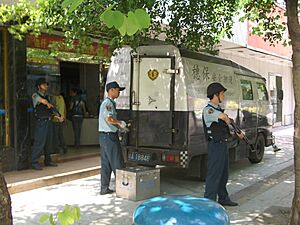
Alberta and Ontario prohibit the use of the term Security Officer, which has been in widespread use in the United States for many decades. Recent changes to the act have also introduced restrictions on uniform and vehicle colours and markings to make private security personnel clearly distinctive from police personnel. Some sources feel that some of these restrictions are put in place to satisfy the Canadian Police Association. Specialized VIP security guard services and companies are in high demand and are defined by their ability to protect celebrities and executives during times of unrest. There is a marked difference between persons performing the duties historically associated with watchmen and persons who take a more active role in protecting persons and property. The former, often called "guards", are taught the mantra "observe and report", are minimally trained, and not expected to deal with the public or confront criminals.
The latter are often highly trained, sometimes armed depending on contracts agreed upon with clientele, and are more likely to interact with the general public and to confront the criminal element. These employees tend to take pride in the title "Security Officer" or "Protection Officer" and disdain the label of "guard". Security jobs vary in pay and duties. There is sometimes little relationship between duties performed and compensation, for example some mall "security officers" who are exposed to serious risks earn less per hour than "industrial security guards" who have less training and responsibility. However, there are now more positions in the security role that separate not just the titles, but the job itself. The roles have progressed and so have the areas for which security people are needed. The term "agent" can be confusing in the security industry because it can describe a civil legal relationship between an employee and their employer or contractor ("agent of the owner" in California PC 602), and also can describe a person in government service ("Special Agent Jones of the Federal Bureau of Investigation".) The title "agent" can be confused with bail enforcement agents, also known as "bounty hunters", who are sometimes regulated by the same agencies which regulate private security. The term "agent" is also used in other industries, such as banking agents, loan agents and real estate agents. Security agents are often employed in loss prevention and personal or executive protection (bodyguards) roles. They typically work in plainclothes (without a uniform), and are usually highly trained to act lawfully in direct defense of life or property.
Security officers are private citizens, and therefore are bound by the same laws and regulations as the citizenry they are contracted to serve, and therefore are not allowed to represent themselves as law enforcement under penalty of law.
Training
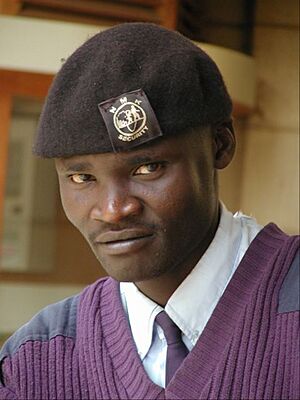
Australia
Any person who conducts a business or is employed in a security-related field within Australia is required to be licensed. Each of the six states and two territories of Australia have separate legislation that covers all security activities. Licensing management in each state/territory is varied and is carried out by either Police, Attorney General's Department, Justice Department or the Department of Consumer Affairs.
- New South Wales—(Police) Security Industry Act 1997 & Security Industry Regulation 2016
- Victoria—(Police) Private Security Act 2004
- Queensland—(Justice & Attorney-General) Security Providers Act 1993
- South Australia—(Consumer & Business Affairs) Security and Investigation Agents Act 1995
- Western Australia—(Police) Security & Related Activities (Control) Act 1996 & Security & Related Activities (Control) Regulations 1997
- Tasmania—(Police) *Security and Investigation Agents Act 2002
- Northern Territory—(Justice) Private Security Act & Private Security (Security Officer/Crowd Controller/Security Firms/Miscellaneous Matters) Regulations;
- Australian Capital Territory—(Regulatory Services) Security Industry Act 2003 & Security Industry Regulation 2003
All of this legislation was intended to enhance the integrity of the private security industry.
All persons licensed to perform security activities are required to undertake a course of professional development in associated streams that are recognised nationally. This has not always been the case and the introduction of this requirement is expected to regulate the educational standards and knowledge base so that the particular job can be competently performed. Strict requirements are laid down as to the type of uniform and badge used by security companies. Uniforms or badges that may be confused with a police officer are prohibited. Also, the use of the titles 'Security Police' or 'Private Detective' are unacceptable. While the term security guard is used by companies, government bodies and individuals, the term security officer is deemed more suitable. Bouncers use the title Crowd Controllers, and Store Detectives use the title Loss Prevention or Asset Protection Officers. Security Officers may carry firearms, handcuffs or batons where their role requires them to do so and then only when working and have the appropriate sub-class accreditation to their license.
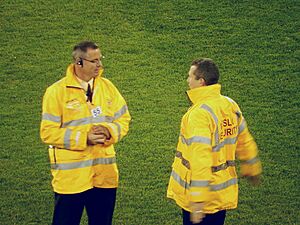
Canada
In Canada, private security falls under the jurisdiction of Canada's ten provinces and three territories. All ten of Canada's provinces and one of its territories (the Yukon) have legislation that regulates the contract security industry. These eleven jurisdictions require that companies that provide security guard services and their employees be licensed. Most provinces in Canada regulate the use of handcuffs and weapons (such as firearms and batons) by contract security companies and their employees, either banning such use completely or permitting it only under certain circumstances. Additionally, in some provinces, some terms, or variations of them, are prohibited either on a uniform or in self-reference.
Canada's federal laws also restrict the ability of security officers to be armed. For example, section 17 of the Firearms Act, 1995 makes it an offense for any person, including a security officer, to possess prohibited or restricted firearms (i.e. handguns) anywhere outside of his or her home. There are two exceptions to this prohibition found in sections 18 and 19 of the Act. Section 18 deals with transportation of firearms while Section 19 deals with allowing persons to carry such firearms on their persons to protect their lives or the lives of other persons, or for the performance of their occupation (Armour Car Guards, Licensed Trappers), provided an Authorization to Carry (ATC) is first obtained.
British Columbia
Private security in the province of British Columbia is governed by two pieces of legislation: the Security Services Act and the Security Services Regulation. These laws are administered and enforced by the Security Programs and Police Technology Division of the Ministry of Public Safety and Solicitor General. The legislation requires that guards must be at least 19 years old, undergo a criminal background check, and successfully complete a training course. As far as weapons, British Columbia law severely restricts their use by security officers. Section 11(1)(c) of the Security Services Regulation prohibits security personnel from carrying or using any "item designed for debilitating or controlling a person or animal", which the government interprets to include all weapons. As well, section 11 forbids private security from using or carrying restraints, such as handcuffs, unless authorized by the government. However, as in other parts of Canada, armoured car officers are permitted to carry firearms. In the past, only personnel that worked for contract security, that is, security companies, were regulated in British Columbia. However, as of September 1, 2009, in-house security officers and private investigators came under the jurisdiction of the Security Services Act and Security Services Regulation. Bodyguards and bouncers, effective November 1, 2009, are also subject to these regulations.
United Kingdom
SIA licence
As a requirement of the Private Security Industry Act 2001, the UK requires all contract security officers to have a valid Security Industry Authority licence. The licence must be displayed when on duty, although a dispensation may be granted for store detectives, bodyguards and others who need to operate without being identified as a security guard. (This dispensation is not available to Vehicle Immobilisers).
Licenses are valid for three years and require the holders to undergo formal training, and are also to pass mandatory Criminal Records Bureau checks. Licences for Vehicle Immobilisers are valid for one year.
Non SIA licence
Some people working as 'in-house' security guards/officers do not need an SIA licence. 'In-house' means they are directly are employed by the company/people they are protecting, such as supermarkets and not if they work for a security company. The UK supermarket Asda is one such example who directly employ in-house guards, who as such need not have an SIA licence to work.
There are two exceptions to this about 'in-house' guards:
- door supervision at a licensed premises
- vehicle immobilising – this only applies in Northern Ireland.
Both of these need SIA licences.
Unarmed Guarding
Armed guarding and guarding with a weapon are illegal in the United Kingdom, as almost all citizens are prohibited from carrying most firearms (such as a pistol), or offensive weapons (such as a baton).
The banned list includes:
- batons,
- incapacitant spray (pepper spray, OC spray)
- firearms,
- Tasers, stun guns.
However, guards may carry handcuffs and leg/arm restraints (although this is rare as the grounds for using them are narrow),> and some may wear stab-resistant vests (such as cash-in-transit guards).
United States
Private security guards have outnumbered police officers since the 1980s, predating the heightened concern about security brought on by the September 11 attacks of 2001. The more than 1 million contract security officers, and an equal number of guards estimated to work directly for U.S. corporations, is much greater than the nearly 700,000 sworn law enforcement officers in the United States. Most states require a license to work as a security officer. This license may include a criminal background check or mandated training requirements. Security guards have the same powers of arrest as a private citizen, called a "private person" arrest, "any person" arrest, or "citizen's arrest". If weapons are carried, additional permits and training are usually required. Armed security personnel are generally employed to protect sensitive sites such as government and military installations, armored money transports, casinos, banks and other financial institutions, and nuclear power plants. However, armed security is quickly becoming a standard for vehicle patrol officers and on many other non-government sites.
The responsibilities of security guards in the United States are expanding in scope. For example, a trend is the increasing use of private security to support services previously provided by police departments. James F. Pastor addresses substantive legal and public policy issues which directly or indirectly relate to the provision of security services. These can be demonstrated by the logic of alternative or supplemental service providers. The use of private police has particular appeal because property or business owners can directly contract for public safety services, thereby providing welcome relief for municipal budgets. Finally, private police functions can be flexible, depending upon the financial, organizational, political, and circumstances of the client.
Arizona – Licensed security companies are required to provide eight hours of pre-assignment training to all persons employed as security guards before the employee acts in the capacity of a security guard. There is a state-mandated curriculum that must be taught, and subjects covered must include criminal law and laws of arrest, uniforms and grooming, communications, use of force, general security procedures, crime scene preservation, ethics, and first response.
California – Security Guards are required to obtain a license from the Bureau of Security and Investigative Services (BSIS), of the California Department of Consumer Affairs. Applicants must be at least 18 years old, undergo a criminal history background check through the California Department of Justice (DOJ) and the Federal Bureau of Investigation (FBI), and complete a 40-hour course of required training. This required training is broken down into smaller training sections and time-lines. The first is 8 hours of BSIS-designed instruction on powers to arrest and weapons. Then, within 30 days of getting the individual officers license, they must receive 16 hours of training on various mandatory and elective courses. Finally, within 6 months of getting their license, they must receive an additional 16 hours of training on various mandatory and elective courses. California security officers are also required to complete 8 hours of annual training on security-related topics, in addition to the initial 40 hours of training. The training and exam may be administered by any private patrol operator or by any of a large number of certified training facilities. This training can be in the classroom or online.
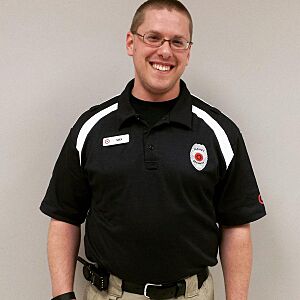
Illinois – Security Guards / Security Officers in Illinois are required to have a valid Permanent Employee Registration Card, also known as a PERC Card for short. You also have to be a minimum of 18 years old to work as an unarmed security guard, and a minimum of 21 years old to work as an armed security guard. A valid Firearm Owner's Identification Card, also known as a FOID Card for short, is also required if working as an armed security guard.
New Jersey – As of 2006 all security personnel employed by a "security officer company" which provides security services to other entities by contract must undergo a state mandated certified training program. This law, commonly referred to as SORA, is the state's effort to increase the quality of security personnel. Security personnel employed by other types of businesses do not require the SORA certification card. However, those employed by the Atlantic City casinos are required to have the state issued "Casino Employee Registration" card.
New Mexico – As of 2008 all security guards must undergo FBI background checks and a certified training program. Guards who carry firearms must also undergo additional training with a firearm through an approved firearms instructor and pass a psychological exam. The security industry is regulated through the New Mexico Regulation and Licensing Division.
New Orleans, Louisiana – The City of New Orleans Department of Police in accordance with New Orleans Home Rule Charter section 4-502 (2) (a) (b) and New Orleans Municipal Code 17-271 MCS 90-86, deputizes armed Security Officers, Private Investigators, College Campus Police, City, State, and Federal agencies, within the city limits, with limited Police Power as New Orleans Police Special Officers. New Orleans Municipal Code 17-271 MCS 30-1122 states It shall be unlawful for any person to act as an armed guard unless he is a Peace Officer. Louisiana R.S. 40:1379.1 (b) states the Special Officer, when performing those tasks requiring a Special Officer's commission, shall have the same powers and duties as a Peace Officer. Special Officers may make arrest for felony or misdemeanor offenses on the property or area they are to protect, patrol, or in relation to their direct assignment. The Special Officer when making an arrest may pat down the arrested subject for weapons. Special Officers are to turn over arrested subjects and pertaining evidence to a New Orleans Police Officer. Special Officers or to honor all subpoenas on arrest made and appear in court to testify. Special Officers when not on a particular assignment are regarded as private citizens and have no Police Power. However, Special Officers still may make an arrest for a felony, whether in or out of his presence, while not on a particular assignment, under Louisiana Law CCRP art.214 Arrest by private person; when lawful.
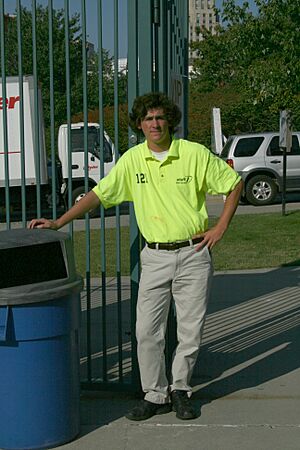
North Carolina – Security Officers in North Carolina are required to register and become certified with the Private Protective Services Board (PPSB), the private security authority body under the North Carolina Department of Justice. The purpose of the Private Protective Services Board is to administer the licensing, education and training requirements for persons, firms, associations and corporations engaged in private protective services within North Carolina. The board is totally fee funded and is staffed by departmental employees directed on a daily basis by the Director, who is appointed by the Attorney General. There are two classifications for an officer: armed and unarmed. While an unarmed officer is required to take a 16-hour class of training and instruction to become certified, an armed officer must take additional hours of classroom training as well as qualify on a gun range with the firearm which will be carried on duty.
Oklahoma – Security officers in Oklahoma are licensed by CLEET (Council on Law Enforcement Education and Training). To be licensed as an unarmed officer an individual must be at least 18 years of age and undergo 40 hours of classroom training and pass criminal history checks. Armed guards must be 21 years of age, have another 40 hours of classroom training, qualify with their firearm and pass a psychological evaluation.
Oregon – Security officers in Oregon must be licensed as either an unarmed, armed, or event security professional by the Department of Public Safety, Standards and Training to be employed for the purpose of providing security services. Unarmed and event professionals must be at least 18 years of age or older and armed professionals must be 21 years of age or older. All security professionals are required to complete classroom instruction and armed professionals also need to complete a basic marksmanship course. Supervisors and managers have an additional certification that is completed by additional classroom training. Loss prevention officers are required to have an unarmed or armed certification.
Pennsylvania – No licensing requirements to be an unarmed security guard. However, anyone who carried a firearm or other "lethal weapon" in the course and scope of their employment must be trained as a "Certified Agent" and successfully complete a 40-hour training course (including shooting range time) in order to be certified to carry weapons while on duty under the Lethal Weapons Training Act (commonly referred to as Act 235 certification). Certification involves completing a medical physical exam, a psychological examination, classroom training and qualifying on a pistol range, with firing of 50 rounds of ammo larger than a .380acp. Agents are also required to qualify on a shotgun. The certification is good for five years at which time an eight-hour refresher course must be taken or the certification is revoked.
South Carolina – All Security Officers have the same authority and power of arrest as Sheriff's Deputies, while on the property they are paid to protect, and according to Attorney General Alan Wilson, are considered Law Enforcement for the purpose of making arrests and swearing out a warrant before the magistrate. Private Officers may respond to calls for service, make arrests and use blue lights and traffic radar. They may also be specially authorized by the State Law Enforcement Division (SLED) to issue Uniform Traffic Tickets to violators. Security Officers are licensed or registered (as appropriate) by SLED for one year at a time. Training for unarmed officers is 8 hours, an additional 8 hours is required for a security weapons permit or a concealed security weapons permit. Additional hours are required to be documented for officers issuing public or private tickets as well as officers who will be using batons, pepper spray or tasers.
St. Louis, Missouri – Security officers are required to be licensed by the St. Louis County Police Department or St. Louis Police Department. St. Louis County security officer training is a two-day class and yearly renewal class. Armed officers must shoot bi-annually to keep their armed status. County license is called a Metropolitan License, meaning it is good for St. Louis City and County. The St. Louis City web site has all the information regarding licensing requirements, as they are the same in the city and county.
Texas – There are three types of Security Officer license types in the state of Texas. Each requires a certain level of training. All training and licensing is regulated by the Department of Public Safety's Private Security Bureau. The three types of licenses are
- Required Training: Level II/Non Commissioned Officer requires 6 hours of classroom based training. This course may be taught by any licensed company directly to new hires. The Owner, Qualified Manager, or a designee of the Qualified Manager may teach the course. At the completion of the course the candidate must pass a multiple choice exam. There are no pre requisites to this course or license.
- Background Check: FBI background check and electronic fingerprint imaging
- Renewal: Submission of renewal fee every two years. No required renewal course.
- Required Training: Level III/Commissioned Officer requires a 40-hour Level III course. The training for this license consists of classroom based learning, defense tactics, handcuffing, and firearms training. At the completion of the course the candidate must pass a firearms proficiency test and a multiple choice exam. This license requires the previous Level II course to be completed first. This course may only be taught by a licensed Level III instructor working under a state licensed Level III security training school.
- Background Check: FBI background check and electronic fingerprint imaging
- Renewal: Submission of renewal fee and proof of completion of a 6-hour re-qualification class taught by a Level III instructor under a Level III training school. The re-qualification course requires completion of a multiple choice exam and a firearms qualification. This is done every two years.
- Required Training: Level IV/ Personal Protection Officer requires a 15 hours course teaching additional law, defense tactics, considerations for personal protection of a client, and OC training. This license requires the previous Level II and Level III courses to be completed first. This course may only be taught by a licensed Level IV instructor working under a state licensed Level IV security training school.
- Background Check: FBI background check and electronic fingerprint imaging
- Psychological Testing: In addition to the training and background check a PPO must also submit an MMPI (psychological test) administered by a Texas licensed Psychologist.
- Renewal: Submission of renewal fee and a current Level III/ Commissioned Officer license or pending renewal of Level III/Commissioned Officer license.
Virginia – Since the 1980s, Security Officers in Virginia are required to be certified by DCJS (Department of Criminal Justice Services, the same agency that certifies law enforcement officers). To be certified as an unarmed security officer one must go through 18 hours of classroom training from a certified instructor in order to obtain this card and it must be done by the end of their 90 days after hire with a Security company. Every two years the card must be renewed, by completing an in-service with a certified instructor. To be certified as an armed security officer one must complete an additional 24 hours of firearms training, 8 hours of training in conducting a lawful arrest, and qualification with the type and caliber of weapon they intend to carry. Firearms endorsements must be renewed annually by completing an in-service and passing a firearms qualification. Certified armed security officers are authorized under state code to arrest for any offense committed in their presence while they are on duty at the location they are hired to protect. Unarmed officers have no arrest powers. They also are granted the authority by the state law to issue summons to appear in court for felonies and misdemeanors. Virginia also allows security officers to attend additional 40 hours of training to become certified as Conservators of the Peace (Special Police) for the company employing them. This appointment is performed by a Circuit Court Judge, wherein the officer is actually sworn in and has the powers of a police officer on property they are working, as well as the lawful duty to act upon witnessing any felony and the ability to pursue fleeing felons. Such sworn officers are also permitted the use of sirens and red lights. Those who handle K-9s, work as dispatchers, alarm responders, private investigators, instructors, bounty hunters, armored car couriers and Executive Protection Specialists are other categories of training regulated by DCJS with additional training requirements. All positions require State Police and FBI background checks.
Australia
In Australia, regulations and restrictions pertaining to the private security industry varies by state. In the state of Victoria, individuals employed in the private security industry, or wishing to be employed in the industry must hold a valid 'Private security licence' which qualifies and outlines what activities they are allowed to perform in the industry. Private security licenses in Victoria are issued and managed by Victoria Police Licensing and Regulation Division.
A list of activities applicable to a Victorian private security license include:
- Security Guard
- Crowd Controller
- Bodyguard
- Investigator
Police
Security personnel are not police officers, unless they are security police. Security personnel derive their powers from state or provincial laws, which allow them a contractual arrangement with clients that give them Agent of the Owner powers. This includes a nearly unlimited power to question with the absence of probable cause requirements that frequently dog public law enforcement officers. In essence, security officers keep private property / persons safe from hazards, whereas police officers protect entire communities by enforcing laws and arresting suspected offenders. Some jurisdictions do commission or deputize security officers and give them limited additional powers, particularly when employed in protecting public property such as mass transit stations. This is a special case that is often unique to a particular jurisdiction or locale. Additionally, security officers may also be called upon to act as an agent of law enforcement if a police officer, sheriff's deputy, etc. is in immediate need of help and has no available backup.
Some security officers do have reserve police powers and are typically employed directly by governmental agencies. Typically, these are sworn law enforcement personnel whose duties primarily involve the security of a government installation, and are also a special case. Other local and state governments occasionally enter into special contracts with security agencies to provide patrol services in public areas. These personnel are sometimes referred to as "private police officers".
See also
- Access control
- Airport security
- Armored car (valuables)
- Bodyguard
- Bounty hunter
- Car guard
- Certified Protection Officer
- Commissionaire
- Counterterrorism
- Executive protection
- Hotel detective
- Infrastructure security
- List of private security companies
- Loss prevention
- Northern Ireland Security Guard Service
- Nuclear security
- Paramilitary
- Physical security
- Police officer
- Port security
- Private investigator
- Private military company
- Private security company
- Security
- Security police
- Store detective
- Traffic guard
- Transportation security officer
- Use of force continuum


